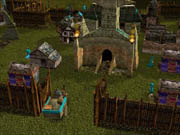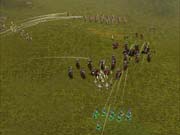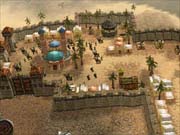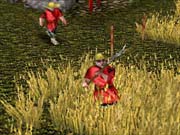Warrior Kings is a very good 3D real-time strategy game that could have been great. The underlying design is excellent, and it adds some interesting complexities to the standard structure of the typical real-time strategy game. But Warrior Kings' creativity is also its biggest shortcoming. The developer, Black Cactus, produced a great premise, full of unique units, an interesting economic structure, and mystical elements that lead to powerful units and spells. However, this premise is the stage for a campaign made up of linear puzzle missions that require very little strategy and a whole lot of patience. The multiplayer mode doesn't have these problems, but since there's no skirmish option available for playing the core strategic game against the computer, the game's appeal is a lot more limited than it might have been.

Warrior Kings takes place in a world torn between religion and technology. There are two primary factions, the imperials and the pagans, each with unique units and divine powers. Both factions can incorporate renaissance elements, such as siege engines and gunpowder, but by doing so, they sacrifice access to their most powerful units.
The single-player campaign follows the story of Artos, exiled heir to the throne. After seeing his father ambushed and betrayed, Artos flees his homeland to gather forces and plot his revenge. The campaign lets you follow several paths, and it branches based on the choices you make at a few key moments. For instance, in the second mission, you must choose whether or not to execute your enemy once you have him cornered. Kill him, and you'll follow the pagan path, which lets you command huge beasts and strange magic. Spare his life, and you'll move down the imperial path toward religion and fanatical righteousness. Later, you'll have the option to stay on a pure pagan or imperial path or incorporate elements of technology, again altering the campaign. It's great that the campaign goes in such different directions based on your choices--you won't just get different units, but an entirely different game with unique missions.
While the branching campaign is an interesting idea, the actual method of branching is disappointing. Instead of letting you choose your path through a strategic decision, you simply answer yes/no questions at predetermined points along the way. The choices you make come without warning, occasionally at the end of a mission and other times at the beginning. Unless you have some luckily timed saved games, you'll undoubtedly need to play through large chunks of the game to try different paths. Essentially, it makes the first few missions of the campaign one lengthy options screen you must play through again and again to try the different factions.

The missions themselves are full of numerous objectives and challenges, but at times you'll feel frustrated that you never just get to play the game. The campaign is full of puzzle missions, and many give you a set number of units with which to accomplish your goals. You don't get to do much town building, especially in the early missions--the designers seemed to consciously try to avoid the standard real-time strategy formula of build a town, build an army, destroy your enemies, raze their town. It may seem like a good thing that Warrior Kings bucks the trend, but it's strange that the single-player game seems so shy about letting you explore the more innovative features, like building a huge civic center or invoking the benefits of your chosen faction. Most of the time, your town will be built for you--then you just build standard units and go attack your enemy.
Even if you won't see it often in the campaign, the basic structure of the game is excellent. You must build a town, starting with peasants to harvest food and lumber. Carts transport the basic commodities to your civic center, and they provide an interesting strategic element, since they can be waylaid and stolen by the enemy. Certain buildings can be built only near your civic center, and the walls that surround this vital area expand automatically. Based on your faction, you can build huge siege engines or powerful religious units. There are numerous military units, ranging from standard spearman and archers to holy knights, soldiers, and enormous monsters that breathe fire.
The combat is good and makes effective use of the 3D terrain. High ground is a significant tactical advantage, giving your archers more range and even letting your mounted units gather speed as they gallop downhill, making for effective charges. Scout units can ascend steep hills and survey the landscape. Your military units gain experience as they fight, and you can set up training dummies to keep them occupied during times of peace. You can easily group units with a single click, which selects all units of a particular type. With groups of eight or more units, you can set them in four different formations--a row, a wedge, a column, and a circle--and these give different and distinct benefits. Occasionally, units won't respond to your orders to rout or engage, but for the most part, the combat is satisfying and easy to control.

Playing a multiplayer game gives you more access to all of this than the single-player game does. You get to choose the technology tree you'll follow based on the buildings you construct. You get to plan your enormous town center and watch it expand into an impressive city. You get to assemble huge armies and march them against your enemy. You get to invoke the powers of gods and even summon them to fight alongside you. The multiplayer game makes the single-player game seem all the more disappointing--with so much potential for epic, strategic battles, Warrior Kings instead gives you missions like one in which you simply guide three units dressed as monks down a preordained path, making no real strategic decisions along the way.
Many of the missions in the single-player campaign are so rigid that they simply become an exercise in saving and reloading, which is even more frustrating than it sounds, considering the game's inexcusably long load times. There are some other significant technical problems, such as crashes and some problems with multiplayer connections, but these will reportedly be addressed with upcoming patches. Perhaps the worst technical problem is the unit pathfinding--you will occasionally see a whole battalion go off in some undesired direction or a mounted regiment riding in crazy circles trying to regroup. The interface has some issues too, but only because it breaks with some of the real-time strategy conventions you're probably used to.
What Warrior Kings really needs is a skirmish mode that lets you enjoy the fun of the multiplayer game in matches against a decent computer opponent. But there is no skirmish mode. This is not surprising, considering that even in the campaign, you are rarely playing against a computer opponent. Instead, you trigger prebuilt units from prebuilt cities to attack you. The artificial intelligence, for the most part, is nonexistent. Enemy units rush as soon as they see you, letting you take out overwhelming forces with an inferior army simply by building huge groups of archers to pick them off as they advance.

You'll face huge armies in Warrior Kings, and you'll raze huge cities. One of the great things about the game is that it lets you build massive armies and sprawling towns. The game looks good, and you can zoom high above the landscape and see birds flying over your town or zoom down to the ground and watch a peasant's face as he harvests a field. There is some significant slowdown when there are numerous units on the screen, but for the most part, the game performs well. The music is excellent, with flutes and lutes and other typical renaissance instrumentations. The sound effects are even better, from your units' comments to the realistic sound of lumber being harvested and even to the sonic cues that tell you an archer has been built or research has been completed.
It may seem strange to criticize a game for not being formulaic, but it's hard not to wish that Warrior Kings included more run-of-the-mill real-time strategy missions. Despite the disappointing campaign, it's a testament to the quality of the fundamental design that multiplayer games are so enjoyable and that the lack of a skirmish option seems like such a major oversight.



